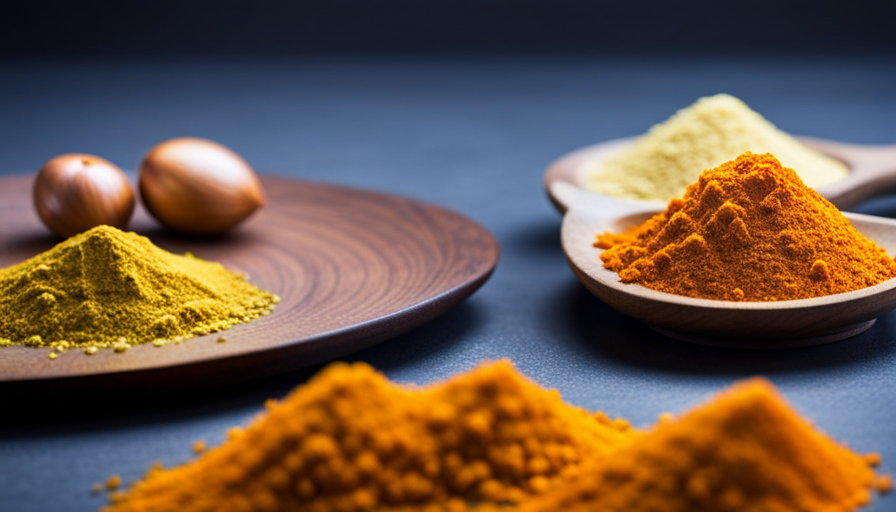In terms of health and wellness, I strongly believe that prevention is key. That’s why I actively seek out natural remedies to support my overall wellbeing.
One such ingredient that has been making waves in the health industry is turmeric. This golden spice has been used in traditional medicine for centuries and is known for its anti-inflammatory and antioxidant properties.
But there’s a debate on whether it’s better to consume turmeric on an empty stomach or with food, and that’s what we’ll be exploring in this article.
As the saying goes, ‘you are what you eat.’ So, it’s essential to understand how our bodies absorb and utilize the nutrients we consume. Turmeric contains an active compound called curcumin, which is responsible for its health benefits. However, curcumin is not easily absorbed by the body, and that’s where the debate comes in.
Some experts suggest consuming turmeric on an empty stomach to enhance its absorption, while others recommend taking it with food to avoid digestive issues.
In this article, we’ll delve deeper into the benefits of turmeric, the factors that affect its absorption, and how to incorporate it into your diet for maximum benefits.
Key Takeaways
- Taking turmeric on an empty stomach can increase absorption and bioavailability.
- Taking turmeric with a meal containing healthy fats can enhance absorption and benefits.
- Taking turmeric with a meal high in fiber or other spices may reduce effectiveness.
- Finding the right balance between taking turmeric on an empty stomach or with food is crucial.
Understanding the Benefits of Turmeric
Turmeric’s benefits are truly remarkable, and understanding them can help you make the most of this powerful spice. Turmeric has been used in traditional medicine for thousands of years, and modern science has confirmed many of its health benefits.
One of the most well-known benefits of turmeric is its anti-inflammatory properties, which can help reduce pain and inflammation in the body. Turmeric supplements are a popular way to consume this spice, but it can also be added to food to enhance the flavor and provide health benefits.
In addition to its anti-inflammatory properties, turmeric has also been shown to have antioxidant, anti-cancer, and anti-bacterial effects. These properties make it a valuable addition to any diet, and many people take turmeric supplements or incorporate it into their meals to support their overall health.
However, there is some debate about the best way to consume turmeric – on an empty stomach or with food.
Exploring the Debate: Empty Stomach vs. With Food
If you want to maximize the benefits of this spice, you might be wondering whether to take it on an empty stomach or with other meals. There’s a lot of debate surrounding this topic, and it can be confusing to know what’s best for you. Here are some things to consider:
-
Some studies suggest that taking turmeric on an empty stomach can increase its absorption and bioavailability in the body.
-
Other research shows that taking turmeric with a meal that contains healthy fats can enhance its absorption and help you reap its full benefits.
-
However, taking turmeric with a meal that’s high in fiber or other spices may interfere with its absorption and reduce its effectiveness.
Ultimately, the best way to take turmeric depends on your individual needs and preferences, as well as your overall diet and lifestyle.
Navigating the empty stomach debate and meal timing confusion can be overwhelming, but by understanding these different factors, you can make an informed decision about how to take turmeric for maximum benefit.
In the next section, we’ll explore some factors that affect turmeric absorption, so you can further optimize your turmeric routine.
Factors that Affect Turmeric Absorption
I’ve been exploring the factors that affect turmeric absorption, and two key points have stood out to me:
- The role of fat and protein can significantly increase turmeric absorption in the body.
- Cooking turmeric can actually improve its bioavailability, as heat helps to release more of the active compounds.
So, if you’re looking to get the most out of your turmeric intake, consider pairing it with a fat or protein source and cooking it in your meals.
The Role of Fat and Protein
Eating a meal that contains fat and protein can enhance the absorption of turmeric’s beneficial compounds. This is because turmeric is a fat-soluble compound, meaning it needs to be taken with fat to be properly absorbed by the body.
The presence of protein in a meal can also interact with turmeric to increase its bioavailability. In addition, consuming fat and protein can activate the enzymes in the body that help break down turmeric, making it easier for the body to absorb and utilize its beneficial properties.
However, it’s important to note that consuming too much fat can lead to digestive discomfort and contribute to weight gain. It’s recommended to consume turmeric with a balanced meal that contains a moderate amount of healthy fats and protein. Additionally, incorporating black pepper into the meal can help increase the absorption of turmeric even further.
Moving on to the next section, it’s important to understand how cooking affects turmeric and its beneficial compounds.
How Cooking Affects Turmeric
When you cook with turmeric, you may be altering the potency and effectiveness of its beneficial compounds. The cooking methods you use can greatly impact the bioavailability changes of turmeric, which can either increase or decrease the amount of curcumin, the active ingredient in turmeric, that your body absorbs.
Here are some ways that cooking can affect turmeric:
-
Heat exposure can cause the breakdown of curcumin, resulting in lower levels of the beneficial compound in your food.
-
Combining turmeric with black pepper can increase the bioavailability of curcumin, as black pepper contains piperine which enhances absorption.
-
Cooking turmeric with fats such as coconut oil may increase the absorption of curcumin, as it is fat-soluble.
-
Boiling turmeric for long periods of time can result in the loss of curcumin, so it’s best to use it in quick-cooking methods such as stir-frying or sautéing.
Overall, it’s important to consider the cooking methods you use when incorporating turmeric into your diet in order to maximize its potential health benefits. Finding the right balance between cooking methods and ingredients can help you get the most out of turmeric.
Finding the Right Balance
Achieving the optimal benefits of turmeric consumption requires finding the right balance between taking it on an empty stomach or with food. Timing turmeric intake is crucial, as it impacts the bioavailability of its active compound, curcumin. Consuming turmeric with food can enhance its absorption, as the presence of fat and black pepper can increase its bioavailability, while taking it on an empty stomach can lead to faster absorption but lower effectiveness due to the lack of fat and black pepper.
To help you determine the best way to consume turmeric, here is a table outlining the pros and cons of taking it on an empty stomach or with food:
| Empty Stomach | With Food | |
|---|---|---|
| Pros | Faster absorption | Enhanced absorption with fat and black pepper |
| Cons | Lower effectiveness | Slower absorption |
Considering these factors, it is recommended to consume turmeric with food, especially when it contains healthy fats and black pepper. This helps increase its bioavailability and maximize its benefits. Now that we know how to optimize turmeric consumption, let’s explore how to incorporate it into our diet.
Incorporating Turmeric into Your Diet
To add some spice to your meals and boost your health, try incorporating turmeric into your daily cooking routine. This vibrant spice can add a burst of flavor to any dish and comes with a plethora of health benefits.
One of the easiest ways to incorporate turmeric into your diet is by using it as a seasoning for your favorite dishes. It pairs well with roasted vegetables, rice dishes, soups, and stews. You can also sprinkle it on top of your morning eggs or add it to your smoothies for an extra antioxidant boost.
If you’re looking for some inspiration, there are plenty of delicious turmeric-based recipes online. From turmeric roasted cauliflower to turmeric chicken curry, there’s a recipe out there for everyone. You can also experiment with using turmeric in your baking by adding it to muffins, cakes, and cookies.
If you’re not a fan of the taste of turmeric, you can also try taking turmeric supplements. Just make sure to talk to your healthcare provider first to ensure it’s safe for you to take and to determine the right dosage.
Frequently Asked Questions
What are the potential side effects of consuming turmeric on an empty stomach?
Based on research, consuming too much turmeric can cause stomach upset, diarrhea, and nausea. To avoid potential side effects, it’s recommended to start with a low turmeric dosage and gradually increase it. Remember to always consult with a healthcare professional before starting any supplement regimen.
Can turmeric be taken with medication or supplements?
When taking medication or supplements, it’s important to consider potential interactions with turmeric. Always follow recommended dosages and consult with a healthcare professional before combining any medications or supplements with turmeric.
How much turmeric should be consumed daily for maximum benefits?
For maximum benefits, I aim to consume 1-2 teaspoons of turmeric daily. Optimal dosage may vary depending on personal needs and health status. Consider turmeric recipes and cooking tips to incorporate into daily meals.
Are there any specific foods that should be avoided when consuming turmeric?
Foods to Avoid When Consuming Turmeric: Tips and Tricks. To maximize the benefits of turmeric, avoid consuming it with high-fat foods that can interfere with absorption. Creative Ways to Incorporate Turmeric into Your Diet: Delicious Recipes are available online.
Can turmeric be consumed in other forms besides powder or supplements?
Yes, turmeric can be consumed in the form of drinks or recipes. Turmeric lattes, smoothies, and curries are popular ways to incorporate this spice into your diet. Check out recipes online for inspiration.
Conclusion
In conclusion, incorporating turmeric into your diet can have numerous health benefits. The debate over whether to consume it on an empty stomach or with food can be confusing, but ultimately, it depends on various factors such as the type of turmeric being used and individual tolerance levels. However, it’s essential to find the right balance to maximize the absorption of its active ingredient, curcumin.
Overall, adding turmeric to your meals or taking it as a supplement can be a practical and actionable way to boost your health. Its anti-inflammatory and antioxidant properties make it a powerful tool for improving overall wellness. So, go ahead and sprinkle some turmeric on your next meal or try a turmeric supplement, and experience the amazing benefits for yourself.
It’s a no-brainer – turmeric is truly a golden spice!










